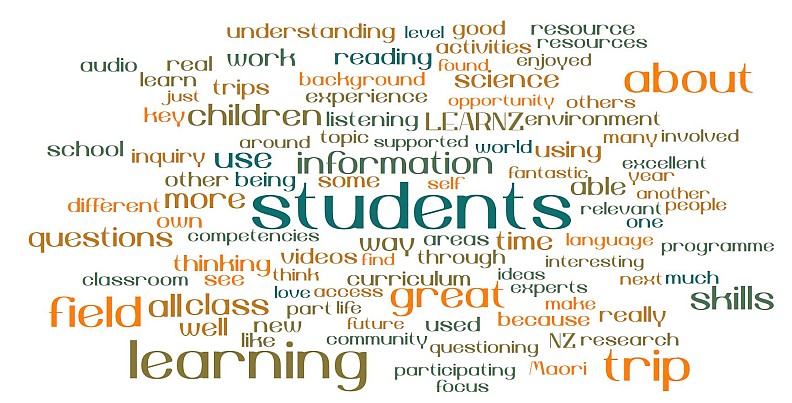You can contact LEARNZ, part of CORE Education, at:
Postal Address:
PO Box 13 678,
Christchurch 8141,
New Zealand

All students (Year 8, Levels 2-5) were able to access and make sense of the content. Antarctica fitted perfectly with our concept study of 'Environments'. It was our first experience and we will be back for more.
We loved the field trip! Thanks so much for all that you do. It is such an engaging way to connect with various areas of the curriculum.
The LEARNZ personnel and experts feel like real friends or students' own personal teacher, which helps to make the learning experiences very potent. They field trips like Antarctica are great and I just love the work you all do to make them interesting and engaging. Thank you.
It has been one of the best units I have taught in my 16 years of teaching - I would recommend it to anyone. I do think that it has been particularly successful in my classroom because we signed up for the extras such as the ambassador and the audio conferencing - that's what really made it come alive for me and the children in my class.
Really enjoyed it! Lots learnt! Very effective - more so for the older kids but what my young enjoyed most was the diaries.
The field trip supported the development of Key Competencies, and provided up-to-date information relevant to Education for Sustainability.
The unit was an excellent opportunity to integrate the Principles, Values, Key Competencies across a range of curriculum areas within authentic learning situations. The students really enjoy the online learning resources, especially the audio conferences.
It definitely ticked the boxes. A great topic. We enjoyed all that was on offer.
Listening to someone who was there reinforced how close we are to Antarctica and viewing the videos diaries really focused the students into the whole experience. The readings and activities made students manage their time appropriately.
Excellent source of information for the students, aimed at their level, well presented and easy for the students to access and work with. Students found it extremely interesting and they learnt plenty of new things about Antarctica.
Provided real meaning and connections to topical subjects like global warming. There was a high level of interest about Antarctica from the students.
The 'real-time' trip increased motivation for students and hooked them into their learning. The virtual relationship with Shelley was a highlight. A class visit from David Wallace, who visited Antarctica in 2012, reinforced all the students had seen and inquired about through LEARNZ.
My Year 7 & 8 students found the field trip very engaging and effective for many reasons eg. extending knowledge, developing inquiry skills, digital technology. It also covered science and social science well, and variously incorporated the Principles, Values, and Key Competencies of the NZC.
We integrated the learning across all curriculum areas, which was easily done. All my students enjoy learning in this way and the background reading was perfect for my Year 4 class.
The trips like Antarctica are fantastic. It enables all children no matter what ethnicity or socioeconomic group to explore the world. My teaching practice has been transformed as LEARNZ allows me to present learning with a digital approach, using multiple computers and devices and guiding students in combination with Google Classroom.
Children loved every part of the experience- thoroughly engaging. Really cool for the students to be able to participate with a group outside of their immediate context!
I run the GATE programme and we do Future Problem Solving so the ecological sustainability was particularly relevant. A great teaching tool which is motivating for students.
WOW, what a powerful learning tool the Audio Conference was - our extension Year 3-4 students were so engaged in listening and learning that they didn't make a sound.
It has taken my students to new worlds of understanding, given them purpose and focus to read and write about a 'real-life' topic that is of interest to them.
Led to better engagement and met the learning towards taumata 5 tikanga ā-iwi marau in the TMOA. Outcomes for my kura were evident and supported our kura value system or mātāpono, kaitiakitanga (guardianship of our earth mother Papatuānuku) and rangatiratanga (self-determination that comes from our own actions).
This unit linked with our topic of sustainability and enabled cross curricular learning in a digital context. This type of learning resource helps students to work at their level, irrespective of where they start and their reading ability.
The whole field trip has added a sense of authenticity to student learning. This really is a wonderful way to give us invaluable learning experiences - students have been so engaged and have been thinking of their own experiments to test some of the things that they have learnt.
The field trip was very effective, especially from the view point of engagement and motivation as the students felt it was relevant and real.
It was a very REAL and engaging focus for a lot of different interest groups. Use of the Audio conferences was a first and was very impactful for the students.
Students love them (LEARNZ field trips) - they are engaging, use real life contexts which have an impact on students' lives, encourage whanau involvement. Fabulous resource.